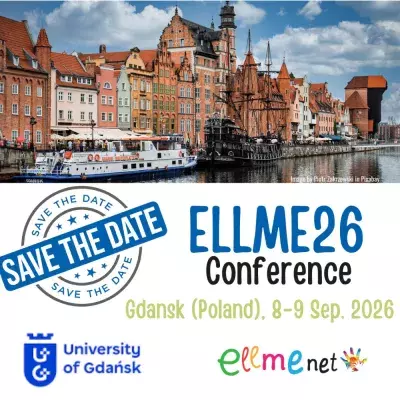Konferencja naukowa – 4th International Conference on Early Language Learning and Multilingualism in Early Childhood Education
4th International Conference on Early Language Learning and Multilingualism in Early Childhood Education
Call for Papers – 4th International Conference on Early Language Learning and Multilingualism in Early Childhood Education
Call for Papers
4th International Conference on Early Language Learning and Multilingual Education in Early Childhood (ELLME'26)
Gdańsk, 8-9 September 2026
Department of Applied Linguistics, Department of Pedagogy and Department of English and American Studies of University of Gdańsk, Poland, in cooperation with ELLMEnet (Early Language Learning and Multilingual Education Network) are proud to welcome researchers from all over the world to contribute to our 4th International Conference on Early Language Learning and Multilingual Education in Early Childhood.
In an increasingly interconnected and globalized world, the significance of multilingualism in the very early years of a child’s development cannot be overlooked. The acquisition of multiple languages during the educational stages of life not only enriches cognitive and linguistic abilities, but also fosters a deep appreciation for diverse cultures and perspectives. This burgeoning area of research has garnered substantial attention from scholars, educators, and policymakers alike, as the advantages of early multilingual exposure extend beyond linguistic prowess to encompass broader cognitive, socio-cultural, and educational dimensions. This 4th ELLME Conference will serve a pivotal platform to delve into the intricate interplay between language acquisition, cognitive development, and social and family engagement.
Promoted by ELLMEnet, this international conference aims at analysing and discussing issues related to multilingualism, in its broadest sense, from birth until the beginning of the compulsory education stage, usually 6/7 years old, as well as early grades of primary education (grades 1-3, approx. till the 9th year).
Researchers, PhD students and practitioners are welcome to present research- or pedagogical-oriented communications related to children from 0 up to 9 years old approximately, contextualised in any multilingual context (second language, foreign language, additional language, minority language, heritage language, sign language, etc.).
Possible topics of interest are:
1. Early language learning
2. Early bi-/multilingual education
3. Early multilingual acquisition
4. Early multilingual identity
5. Multilingual families
6. Second or foreign (L2/F2) language teaching/learning at preschool
7. Classroom practices in early multilingual education
8. Methodological and ethical issues on early multilingual research
9. Teacher education on multilingualism
10. Multilingual policies for early years
Keynote speakers
So as to encourage discussions, the following international keynotes have been invited to contribute to the conference:
Prof. Thomai Alexiou, Aristotle University of Thessaloniki, Greece
Prof. Mila Schwartz, Oranim College Education, Israel
Prof. Piotr Romanowski, University of Warsaw, Poland
Prof. Joanna Rokita-Jaśków, University of the National Education Commission, Poland
Types of speakers’ contributions
As a speaker you can present up to two contributions of the following modalities:
- Presentation: 15-min communication + 5 min discussion.
- Workshop: 60-min, hands-on session on any of the conference topics, either research- or pedagogy-oriented.
- Poster: Dedicated poster sessions will be scheduled during the conference, providing participants with the opportunity to discuss the work directly with the authors. Posters should be research-oriented. Instructions on poster specifications will be provided upon acceptance.
Language
The language of the conference will be English but some sessions could be in Polish.
Important dates
CFP opens 1st December, 2025
CFP closes 20th March, 2026
Notification of acceptance by 31st March, 2026
Early bird registration: 1st April–20th May, 2026
Late bird registration: 21st May 2026–10th July, 2026
Provisional programme available 20th July, 2026
Conference 8th–9th September, 2026
Abstract submission
An abstract (200-250 words) together with a short biodata (70-100 words) needs to be sent through this online form: https://docs.google.com/forms/d/16mtQ033hjrJd5MD6ZzJRVcIy4dj8GEVEGMIDLBdwg_4/viewform?edit_requested=true
DEADLINE for submission: 20th March, 2026.
Please note that the abstract needs to be copied and pasted into the online form, no document can be attached.
Only the corresponding author should send the abstract on behalf of all authors. S/he will need to include information about all other contributors/participants in the online form (full name, affiliation, email address, short bionote).
All abstracts will be blind peer-reviewed by the conference scientific committee. Acceptance notification will be sent to authors no later than 31st March, 2026.
Do not hesitate to contact us if you have any questions or concerns:
Conference email address: ellme26@ug.edu.pl
Post conference publication options
Selected papers will be published in Glottodidactica, a peer-reviewed journal, indexed in Scopus (Glottodidactica)
A post-conference thematic volume or a special issue of another indexed journal (in the process of settling) will be published.
Organizing Committee
Prof. Hadrian Aleksander Lankiewicz, chair
Prof. Beata Karpińska-Musiał, member
Dr. Michał Daszkiewicz, member
Dr. Magdalena Grabowska, conference secretary
Dr. Maciej Pławski, member (website info)

Dr. Małgorzata Smentek-Lewandowska, member
Student assistants:
Julita Tomalak
Martyna Sieńko
Julia Kaczorek
Natalia Krawczyk
Scientific Committee
Prof. Thomai Alexiou, Aristotle University of Thessaloniki, Greece
Prof. Ana Andugar Soto, University of Alicante, Spain
Prof. Beatriz Cortina-Pérez, University of Granada, Spain
Prof. Cristina Corcoll López, Ramon Llull University, Spain
Prof. Dolores Fernández Martínez, University of Las Palmas de Gran Canaria, Spain
Prof. Przemysław Gębal, University of Gdańsk, Poland
Prof. Saeed Karimi Aghdam Ordaklou, Nord University, Norway
Prof. Aneta Lewińska, University of Gdańsk, Poland
Prof. Natalia Martínez León, University of Granada, Spain
Prof. Gina Oxbrow, University of Las Palmas de Gran Canaria, Spain
Prof. Ekaterina Protassowa, University of Helsinki, Finland
Prof. Natasha Ringblom, Umeå University, Sweden
Prof. Joanna Rokita Jaśków, University of the National Education Commission, Poland
Prof. Piotr Romanowski, University of Warsaw, Poland
Prof. Zhailagul Sagyndykova, Ualikhanov University, Kokshetau, Kazakhstan
Prof. Mila Schwartz, Oranim College of Education, Israel
Prof. Anna Szczepaniak-Kozak, Adam Mickiewicz University in Poznań, Poland
Prof. Emilia Wąsikiewicz-Firlej, Adam Mickiewicz University in Poznań, Poland
Prof. Aigul Zhakupova, Ualikhanov University, Kokshetau, Kazakhstan
ELLME'26 Registration fees
ELLME'26 Registration fees
|
Type |
Early bird 1sh April-20th May, 2026 |
Regular 21st May- 10th July, 2026 |
|
Speakers and poster presenters (scholars) |
160 Euro/ 690 PLN |
180 Euro/ 780 PLN |
|
Attendees without presentations; MA and PhD students |
80 Euro/ 350 PLN |
100 Euro/ 430 |
|
In-service teachers (workshop sessions) |
50 Euro/ 220 PLN |
60 Euro/ 260 PLN |
|
Conference dinner |
50 Euro/ 220 PLN |
50 Euro / 220 PLN |
|
Pre-conference meeting in a pub, in the evening on the day before the conference with a walk in the old town. Details will be given a few days before the event. |
Gratuitous but participants pay individually for refreshments |
Gratuitous but participants pay individually for refreshments |
All details regarding registration, travel and the conference programme will be available on conference website:
Conference email address: ellme26@ug.edu.pl
We are looking forward to seeing you in Gdańsk. Save the date!





